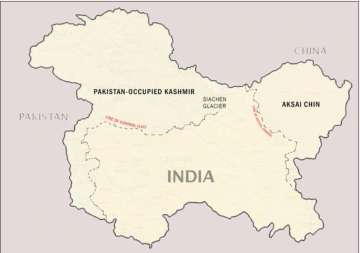PoK, Gilgit-Baltistan exposes atrocities committed by Pakistan
The administration of Gilgit-Baltistan was taken over by Islamabad in 1949. Its constitutional status remains in a flux. Pakistan has rejected demands to grant Gilgit-Baltistan the status of a fifth province, fearing it would compromise its demand for resolution of the Kashmir issue.

The locals of Pakistan Occupied Kashmir (PoK) have been from time and again highlighting the atrocities committed by the Pakistan in the region.
Earlier this month, noted activist of Gilgit-Baltistan Senge H. Sering said that the region he belonged to is a "part of India".
"Gilgit-Baltistan is a part of India. Members of the UN need to realise that Pakistan has become a big stumbling block for last 70 years," Sering, Director, Institute of Gilgit-Baltistan Studies, Washington D.C., said at the UNHRC on September 11.
He also accused the Pakistan of changing the demography of the region. "You will be surprised that while Pakistan is trying to be the attorney of Kashmiri people, it has changed the demography in a huge manner," he said.
He also said that Article 370, which India has revoked, had become a tool to spread terrorism in Jammu and Kashmir.
Gilgit-Baltistan, a part of Pakistan-occupied Kashmir (PoK), has been without access to communication for decades.
Pakistan ceded a part of PoK to China in 1963. Though PoK, which Pakistan calls Azad Jammu and Kashmir, has its own constitution, a prime minister and a president, the real power is vested with Islamabad. India asserts that the whole of PoK is its part since the then King of Jammu and Kashmir Hari Singh had signed the Instrument of Accession with India on October 26, 1947.
The administration of Gilgit-Baltistan was taken over by Islamabad in 1949. Its constitutional status remains in a flux. Pakistan has rejected demands to grant Gilgit-Baltistan the status of a fifth province, fearing it would compromise its demand for resolution of the Kashmir issue.
Last year, Pakistan issued the Gilgit-Baltistan Order, which effectively seized whatever powers remained with the local council and handed them to the prime minister.
The fact that human rights violations are rampant in PoK and especially Gilgit-Baltistan has been recorded by the UN High Commissioner for Human Rights (OHCHR) in its July report.
It clearly says that "restrictions on the freedoms of expression, opinion, peaceful assembly and association in Azad Jammu and Kashmir and Gilgit-Baltistan" has prevented rights observers, including from the OHCHR, to assess the human rights situation there.
It says that while both regions introduced constitutional changes they "failed to address the main elements that restrict the full enjoyment of all human rights for people living in these regions".
It highlighted that "the Interim Constitution of Azad Jammu and Kashmir places several restrictions on anyone criticizing the region's accession to Pakistan, in contravention of Pakistan's commitments to uphold the rights to freedoms of expression and opinion, assembly and association".
It adds that even the "amended Interim Constitution of 2018 has retained the clauses that directly contravene international human rights law. It explicitly continues to state, "(N)o person or political party in Azad Jammu and Kashmir shall be permitted to propagate against, or take part in activities prejudicial or detrimental to, the ideology of the State's accession to Pakistan".
It says authorities in Gilgit-Baltistan "also failed to amend similar provisions in the region's governance rules that restrict the rights to freedoms of expression and opinion, assembly and association".
"Members of nationalist and pro-independence political parties claim that they regularly face threats, intimidation and even arrests for their political activities from local authorities or intelligence agencies. They said often threats are also directed at their family members including children."
The report also cites how journalists in the area face threats and harassment in the course of carrying out their professional duties.
It also criticises the $60 billion China Pakistan Economic Corridor that cuts through the region for being designed without consultation of the locals who feel it will be of little benefit to them.
"A key concern in both Azad Jammu and Kashmir and Gilgit-Baltistan is that the local communities do not control natural resources of the territories as these are controlled by Pakistani federal agencies. Political leaders and activists feel their natural resources are exploited for the benefit of Pakistan while the people of Azad Jammu and Kashmir and Gilgit-Baltistan continue to remain largely impoverished," it says.
The OHCHR report has over 90 references to Gilgit-Baltistan, highlighting the importance it has placed on Pakistan's poor rights record.
In view of this, Pakistan trying to highlight Kashmir at the UNGA is set to fall flat on its face.
(With IANS inputs)
ALSO READ | UN chief may raise Kashmir issue during UNGA discussions: Spokesperson
ALSO READ | No need of force to wrest PoK from Pak, people will join India after seeing development in J&K: Governor
ALSO READ | Pakistan continues false tirade against India, terms Jaishankar's statement over PoK 'inflammatory'